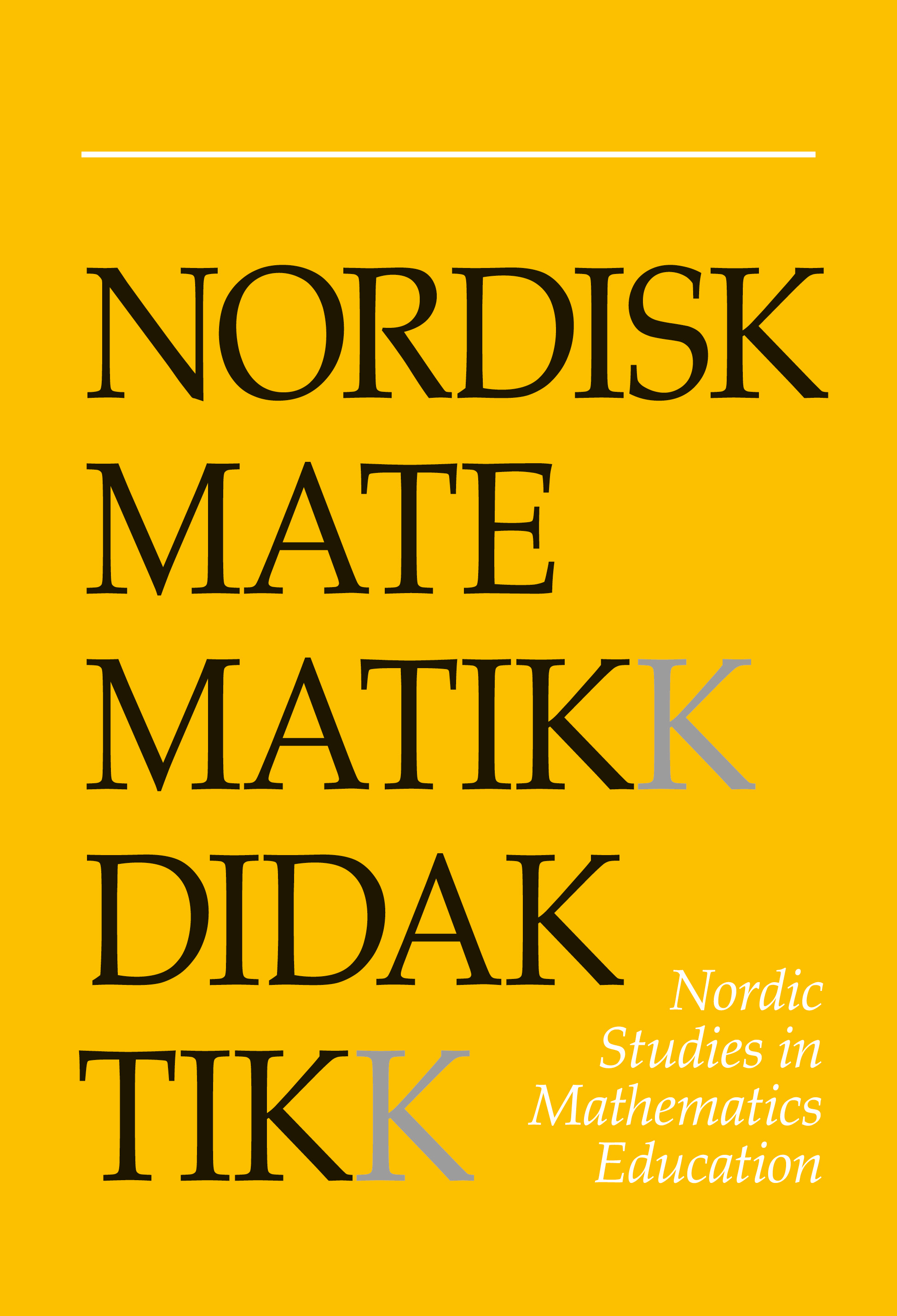Orchestrating mathematical activities in the kindergarten: the role of inquiry
DOI:
https://doi.org/10.7146/nomad.v15i3.148280Abstract
The aim of my study is to address the role played by inquiry in orchestrating a mathematical activity in the kindergarten. The study takes the inquiry cycle as a methodological departure, i.e. the whole process of designing, acting, observing, reflecting, and feeding back. The subtleties of how the kindergarten teachers and a didactician reason in order to orchestrate the mathematical activity and the role played by inquiry in this orchestration are hence analysed. The analyses show how inquiry in every phase of the inquiry cycle, plays a significant role in the orchestration of the mathematical activity. The participants become co-learners in these processes, and are involved in appropriating the mathematical tools and concepts as well as didactical issues involved in orchestrating a mathematical activity in the kindergarten.
References
Akker, J. van den (1999). Principles and methods of development research. In J. van den Akker, R. M. Branch, K. Gustafson, N. Nieveen & t. Plomp (Eds.), Design approaches and tools in education and training (pp. 1-14). Dordrecht: Kluwer Academic Publishers. https://doi.org/10.1007/978-94-011-4255-7_1
Bakhtin, M. M. (1981). The dialogic imagination: four essays.Austin: University of Texas Press.
Bakhtin, M. M. (1986). Speech genres and other late essays.Austin: University of Texas Press.
Carlsen. M. (2010). Appropriating geometric series as a cultural tool: a study of student collaborative learning. Educational Studies in Mathematics, 74, 95-116. https://doi.org/10.1007/s10649-010-9230-0
Carr, W. & Kemmis, S. (1986). Becoming critical. Education, knowledge and action research. London: Routledge Falmer.
Cochran-Smith, M. & Lytle, S. L. (1999). Relationships of knowledge and practice: teacher learning in communities. In A. Iran-Nejad & C. D. Pearson (Eds.), Review of research in education (pp. 249-305). Washington: The American Educational Research Association. https://doi.org/10.3102/0091732X024001249
Freudenthal, H. (1991). Revisiting mathematics education: China lectures. Dordrecht: Kluwer Academic Publishers.
Goodchild, S. (2008). A quest for 'good' research. In B. Jaworski & T. Wood (Eds.), International handbook on mathematics teacher education, Vol. 4: Individuals, teams, communities and networks (pp. 201-220). Rotterdam: Sense Publishers.
Gravemeijer, K. (1994). Educational development and developmental research in mathematics education. Journal for Research in Mathematics Education, 25, 443-471. https://doi.org/10.2307/749485
Jaworski, B. (2005). Learning communities in mathematics: creating an inquiry community between teachers and didacticians. In R. Barwell & A. Noyes (Eds.), Research in mathematics education: Papers of the British society for research into learning mathematics, 7 (pp. 101-120). London: BSRLM. https://doi.org/10.1080/14794800008520148
Jaworski, B. (2007a). Theoretical perspectives as a basis for research in LCM and ICTML. In B. Jaworski, A. B. Fuglestad, R. Bjuland, T. Breiteig, S. Goodchild & b. Grevholm (Eds.), Læringsfelleskap i matematikk - learning communities in mathematics (pp. 121-138). Bergen: Caspar Forlag.
Jaworski, B. (2007b). Learning communities in mathematics: research and development in mathematics teaching and learning. In C. Bergsten, B. Grevholm, H. S. Måsøval & F. Rønning (Eds.), Relating practice and research in mathematics education. Proceedings of Norma05, Fourth Nordic Conference on Mathematics Education (pp. 71 -96). Trondheim: Tapir Akademisk Forlag.
Jaworski, B. & Goodchild, S. (2006). Inquiry community in an activity theory frame. In J. Novotná, H. Moraová, M. Krátká & N. Stehliková (Eds.), Proceedings of the 30th Conference of the International Group for the Psychology of Mathematics Education, Vol. 3, (pp. 353-360). Charles University of Prague.
Johnsen-Høines, M. (2009). Dialogical inquiry in practice teaching. Nordic Studies in Mathematics Education, 14 (1), 39-59.
Kunnskapsdepartementet (2006). Rammeplan for barnehagens innhold og oppgaver (English version available at http://www.regjeringen.no/upload/KD/ Vedlegg/Barnehager/engelsk). Oslo: Kunnskapsdepartementet.
Kennewell, S. (2001). Using affordances and constraints in evaluate the use of information and communications technology in teaching and learning. Journal of Information Technology for Teacher Education, 10, 101-116. https://doi.org/10.1080/14759390100200105
Mercer, N. (2000). Words & minds. How we use language to think together. London: Routledge.
Moschkovich, J. N. (2004). Appropriating mathematical practices: a case study of learning to use and explore functions through inter-action with a tutor. Educational Studies in Mathematics, 55, 49-80. https://doi.org/10.1023/B:EDUC.0000017691.13428.b9
Rogoff, B. (1990). Apprenticeship in thinking. Cognitive development in social context. New York: Oxford University Press. https://doi.org/10.1093/oso/9780195059731.001.0001
Rogoff, B. (1995). Observing sociocultural activity on three planes: participatory appropriation, guided participation, and apprenticeship. In J. V. Wertsch, P. del Rio & A. Alvarez (Eds.), Sociocultural studies of mind (pp. 139-164). Cambridge: Cambridge University Press. https://doi.org/10.1017/CBO9781139174299.008
Roth, W.-M. (1996). Teacher questioning in an open-inquiry learning environment: Interactions of context, content, and student responses. Journal of Research in Science Teaching, 33, 709-736. https://doi.org/10.1002/(SICI)1098-2736(199609)33:7<709::AID-TEA2>3.0.CO;2-R
Säljö, R. (2005). Lärande & kulturella redskap. Om lärprocesser och det kollektiva minnet [Learning & cultural tools: On processes of learning and the collective memory]. Stockholm: Norstedts Akademiska Förlag.
TBM (2006). Teaching better mathematics: collaborative inquiry into mathematics learning and teaching. Project proposal. Retrieved June 4, from http://prosjekt.hia.no/tbm
Vianna, E. & Stetsenko. A. (2006). Embracing history through transforming it: contrasting Piagetian versus Vygotskian (activity) theories of learning and development to expand constructivism within a dialectical view of history. Theory and Psychology, 16, 81-108. https://doi.org/10.1177/0959354306060108
Vygotsky, L. S. (1986). Thought and language. Cambridge: The M. I. T. Press.
Wagner, J. (1997). The unavoidable intervention of educational research: a framework for reconsidering research-practitioner cooperation. Educational Researcher, 26, 13-22. https://doi.org/10.3102/0013189X026007013
Wellington, J. (2000). Educational research. Contemporary issues and practical approaches. London: Continuum.
Wells, G. (1999). Dialogic inquiry: towards a sociocultural practice and theory of education. Cambridge: Cambridge University Press. https://doi.org/10.1017/CBO9780511605895
Wertsch, J. V. (1998). Mind as action. New York: Oxford University Press. https://doi.org/10.1093/acprof:oso/9780195117530.001.0001
Downloads
Published
How to Cite
Issue
Section
License

This work is licensed under a Creative Commons Attribution-NonCommercial-ShareAlike 4.0 International License.



